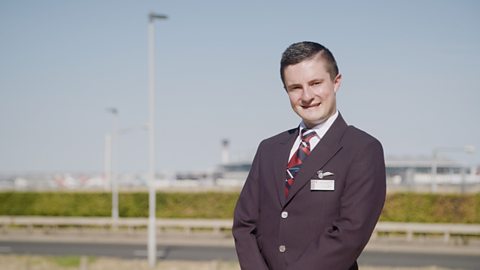Meet James, 28, a freelance translator based in Kent. Find out more about how he uses Portuguese and Spanish in his role. Part of our Bitesize world of work series.
James specialises in audio-visual translation, which involves working on voiceover and subtitle translations. Having studied and lived in both Spain and Portugal, he uses his language skills to translate Portuguese and Spanish content into English. As he has a particular interest in sport, his work often entails transcribing interviews that journalists do with sports professionals before and after a match, which are then published online.
The main positive of being a freelance translator is that it gives me the flexibility to choose my hours, where I work and the types of jobs that I want to do.
James:Meu nome é James e eu sou tradutor independente. - I'm James and I'm a freelance translator.
I'm James and I'm a freelance translator.
I translate audio and video files from Portuguese and Spanish into English.
Ol√° a todos ‚Äď s√≥ queria fazer algumas perguntas sobre o trabalho de amanh√£‚Ķ - Hi everyone ‚Äď I just wanted to ask a few questions about the work for tomorrow‚Ķ
Most of my work is related to sports or medicine. I typically log on in the morning and check my emails. I then get onto translating any files that I have pencilled in for that day.
I keep a personal tracker, just so that I can keep an eye on deadlines for the day. If any urgent requests come in, I can generally fit them in around what I already have pencilled.
One of my specialisms is audio-visual translation, which means working on things like voiceover and subtitled translations.
Olá, bom dia. Como tudo vai? - Hi, good morning. How’s it going?
As a big football fan, one of the most exciting projects I've worked on was for FIFA and the 2018 World Cup, where I translated Brazilian,Portuguese and Spanish players' interviews into English.
Now I often transcribe interviews that players do with journalists before and after their games, and these go up on the UEFA website. I've also done this for the women's Euro 2022 tournament.
The main positive of being a freelance translator is that it gives me the flexibility to choose my hours, where I work and the type of jobs that I want to do. As a freelancer, you find clients yourself, as opposed to working in-house for a company for a salary. I think the biggest challenge as a freelancer is maintaining a steady work flow.
…ou também podemos fazer o passe atrás. - …or we can also pass it back.
I actually studied French and Spanish, both at secondary school and university, and whilst at university they offered a course to use your Spanish skills to convert to Portuguese. I went to Spain for my year abroad as part of my course and ended up spending some time in Portugal, which really helped me to immerse myself in the language.
…esse mesmo projeto para amanhã. - …that same project for tomorrow.
My first job in the industry was an in-house role at a translation company. I'd met them in my final year as an undergraduate and they noticed on my CV that I could speak Portuguese.
When I was finishing my master's degree, they asked me to apply for a permanent role that was coming up, and I was successful.
I decided to go freelance after a few years, mainly so that I could have more variety and freedom in my workload, and also so that I could branch more into sports translation.
My top tip to students would be to be patient with language learning and to try to pick one up at school. It makes it a lot easier to pick up other languages later in life, because you already have a solid foundation of grammar structures and vocabulary.
Sim, foi isso. Exatamente. - Yes, that was it. Exactly.
Sometimes it can be difficult to get into translation, but there are a few things that can help. Firstly, I would advise students to get in touch with their language course leaders or their university careers advisers, as they can often put you in touch with the right people. For example, former students who now work at translation agencies.
…e então o restante para o dia seguinte? - …and then the rest of it for the following day?
When I was starting out, I sent my CV to language service providers and asked for internship roles to find some initial experience.
Social media sites can also be very useful to set up job search alerts using keywords related to your languages or to connect with potential employers.
There are lots of companies you can approach that aren't translation agencies. For example, finance and technology companies often hire people with language backgrounds.
I recommend being proactive and persistent. It can take a while to find the right opportunities, but your efforts will pay off
Perfeito, sim. Muito obrigado! Tchau. - Yes, that’s perfect. Thanks very much! Bye.
- The main skills James uses in his role include organisational and communication skills
- He studied Spanish and French at both secondary school and university, but whilst at university, they offered a course where he could use his Spanish skills to learn Portuguese. James loved it and ended up continuing the three languages all the way through university
- He went to Spain for a year abroad as part of his course and ended up spending some time in Portugal, which really helped to immerse himself in the language. He was able to pick up Portuguese quite easily because he had a good level of Spanish, which is in the same language family
- His ability to speak and translate both Portuguese and Spanish has opened up opportunities to work on large sporting events that he has an active interest in, such as the FIFA World Cup and UEFA Women's Championships
- His first job in the industry was an in-house role at a translation company, who he met during his final year at university. They noticed that James could speak Portuguese and asked if he wanted to apply for a permanent role that was coming up
- After a few years, James made the decision to work as a freelancer so he could branch more specifically into sports translation and have more control over his workload.

Top tips
- Be patient with language learning and try to pick one up at school. It makes it a lot easier to pick up other languages later in life because you already have a solid foundation of grammar structures and vocabulary
- It can be difficult to get into translation but speaking to language course leaders or university career advisors can be helpful. They can often put you in touch with the right people, such as former students who now work at translation agencies
- Sending your CV to language service providers and asking for internship roles can be a great way to find that initial experience. Social media sites can also be useful for connecting with future employers and setting up job search alerts, using keywords related to your languages. It's just a matter of being pro-active and persistent!

What to expect if you want to be a translator
- Translator average salary: variable
- Translator typical working hours: 37 to 39 hours per week
What qualifications do you need to be a translator?
You could get into this role via a university course, applying directly or a qualification with a professional body.
Sources: LMI for All, National Careers Service
This information is a guide and is constantly changing. Please check the for the latest information and all the qualifications needed.
For careers advice in all parts of the UK visit: , , and .

Maddy: a social brand manager. video
Maddy manages anything to do with social media for L'Oréal.

How I use modern languages in my career. collection
Find out more about careers that use modern languages.

Will: cabin crew. video
Will is cabin crew for British Airways based at London Heathrow Airport.
